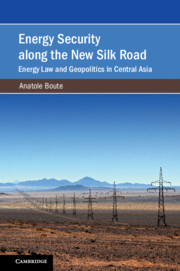Crossref Citations
This Book has been
cited by the following publications. This list is generated based on data provided by Crossref.
2019.
Highlights of Recent Book Publications (August 2018 to July 2019).
Transnational Environmental Law,
Vol. 8,
Issue. 3,
p.
589.
Shadrina, Elena
2020.
Non-Hydropower Renewable Energy in Central Asia: Assessment of Deployment Status and Analysis of Underlying Factors.
Energies,
Vol. 13,
Issue. 11,
p.
2963.
Acworth, William
de Oca, Mariza Montes
Boute, Anatole
Piantieri, Carlotta
and
Matthes, Felix Christian
2020.
Emissions trading in regulated electricity markets.
Climate Policy,
Vol. 20,
Issue. 1,
p.
60.
Trincado, Estrella
Sánchez-Bayón, Antonio
and
Vindel, José María
2021.
The European Union Green Deal: Clean Energy Wellbeing Opportunities and the Risk of the Jevons Paradox.
Energies,
Vol. 14,
Issue. 14,
p.
4148.
Chikanayev, Shaimerden
2021.
Kazakhstan’s Developmental Journey.
p.
153.
Bogojević, Sanja
and
Zou, Mimi
2021.
Making Infrastructure ‘Visible’ in Environmental Law: The Belt and Road Initiative and Climate Change Friction.
Transnational Environmental Law,
Vol. 10,
Issue. 1,
p.
35.
Iftikhar, Mohid
and
Zhan, Jing Vivian
2022.
The Geopolitics of China’s Overseas Port Investments: A Comparative Analysis of Greece and Pakistan.
Geopolitics,
Vol. 27,
Issue. 3,
p.
826.
Shadrina, Elena
2022.
A double paradox of plenty: renewable energy deployment in Central Asia.
Eurasian Geography and Economics,
Vol. 63,
Issue. 1,
p.
1.
Hou, Pengfei
2023.
Bridge or base? Chinese perceptions of Central Asia under Europeanisation.
Central Asian Survey,
Vol. 42,
Issue. 3,
p.
577.
Boute, Anatole
2023.
Shaping the Eurasian Gas Market: The Geopolitics of Energy Market Regulation.
Geopolitics,
Vol. 28,
Issue. 5,
p.
2042.
Howie, Peter
and
Akhmetov, Daulet
2024.
Socio-economic constraints to low-carbon transitions: insights from Kazakhstan’s Emissions Trading Scheme.
Climate Policy,
p.
1.
Shadrina, Elena
2024.
Central Asia in a Multipolar World.
p.
445.
Goziyev, Ravshan
2024.
International Relations Dynamics in the 21st Century.
p.
349.



